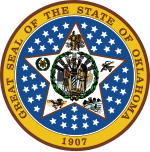2008 Oklahoma Democratic presidential primary
| |||||||||||||||||||||||||
38 pledged delegates to the 2008 Democratic National Convention | |||||||||||||||||||||||||
|---|---|---|---|---|---|---|---|---|---|---|---|---|---|---|---|---|---|---|---|---|---|---|---|---|---|
| |||||||||||||||||||||||||
 Primary results by county Clinton: 30–40% 40–50% 50–60% 60–70% Obama: 40–50% | |||||||||||||||||||||||||
| Elections in Oklahoma |
|---|
 |
|
|
The 2008 Oklahoma Democratic presidential primary, part of the process of selecting that party's nominee for President of the United States, took place on February 5, one of the many nominating contests of 2008's "Super Tuesday". The primary election chose 38 pledged delegates to represent Oklahoma at the 2008 Democratic National Convention. The remainder of Oklahoma's 47 delegates consisted of unpledged superdelegates not bound by the results of the primary. The election was a closed primary, meaning that only registered Democrats could vote in this election. Hillary Clinton won the primary by a significant margin.
Clinton, Barack Obama, and Jim Rogers appeared on the ballot, together with four candidates who had already withdrawn from the contest: Chris Dodd, Bill Richardson, Dennis Kucinich, and John Edwards. All but Rogers had run nationwide campaigns for the presidential nomination; Rogers is a perennial candidate in Oklahoma who had run for lieutenant governor in 2006.
Pre-primary polling, predictions, and events
[edit]Early polling in Oklahoma consistently showed Clinton and Edwards to be the leaders in the state, and Obama a more distant third. The polling also indicated that other candidates were barely registering. In 2004 Edwards narrowly finished second in Oklahoma behind Wesley Clark by about one thousand votes. Oklahoma had been a key state for John Edwards as he made stops in the state January 15 and 18, over three weeks ahead of the primary date, but Edwards withdrew on January 30, 2008. Former President Bill Clinton stopped at the University of Oklahoma on January 30 to speak at a rally supporting his wife.
Money raised from Oklahoma
[edit]Obtained from The Oklahoman [1]
| Candidate | Money raised (US$) |
|---|---|
| John Edwards | $397,316 |
| Barack Obama | $396,592 |
| Bill Richardson | $83,070 |
| Hillary Clinton | $508,050 |
| Joe Biden | $5,400 |
| Chris Dodd | $850 |
| Dennis Kucinich | $3,767 |
Delegates
[edit]Oklahoma sent 47 delegates to the Democratic National Convention. In order to secure pledged delegates, a candidate had to receive at least 15% of the vote. The delegates were broken down into the following categories:
- 38 pledged delegates, allocated based on the results of the primary:
- 25 District Level Delegates were allotted proportionally based on the support each candidate received in each congressional district. There were 5 delegates for each congressional district.
- 8 At-large Delegates were allotted proportionally based on the support each candidate received statewide.
- 5 party leaders and elected officials ("PLEO Delegates") were allotted proportionally based on the support each candidate received statewide.
- 9 unpledged superdelegates consisting of PLEOs were not bound by the results of the primary.
Results
[edit]| Key: | Withdrew prior to contest |
| 2008 Oklahoma Democratic presidential primary[2] | |||
|---|---|---|---|
| Candidate | Votes | Percentage | National delegates[3] |
| Hillary Clinton | 228,480 | 54.76% | 24 |
| Barack Obama | 130,130 | 31.19% | 14 |
| John Edwards | 42,725 | 10.24% | 0 |
| Bill Richardson | 7,078 | 1.70% | 0 |
| Jim Rogers | 3,905 | 0.94% | 0 |
| Christopher Dodd | 2,511 | 0.60% | 0 |
| Dennis Kucinich | 2,378 | 0.57% | 0 |
| Totals | 417,207 | 100.00% | 38 |
See also
[edit]References
[edit]- ^ "Fundraising totals". Oklahoman.com. February 3, 2008. Retrieved May 10, 2021.
- ^ "Presidential Preferential Primary Election". OKLAHOMA STATE ELECTION BOARD. February 5, 2008. Archived from the original on February 8, 2008. Retrieved February 6, 2008.
- ^ "RESULTS: Oklahoma". CNN. February 5, 2008. Retrieved February 5, 2008.



